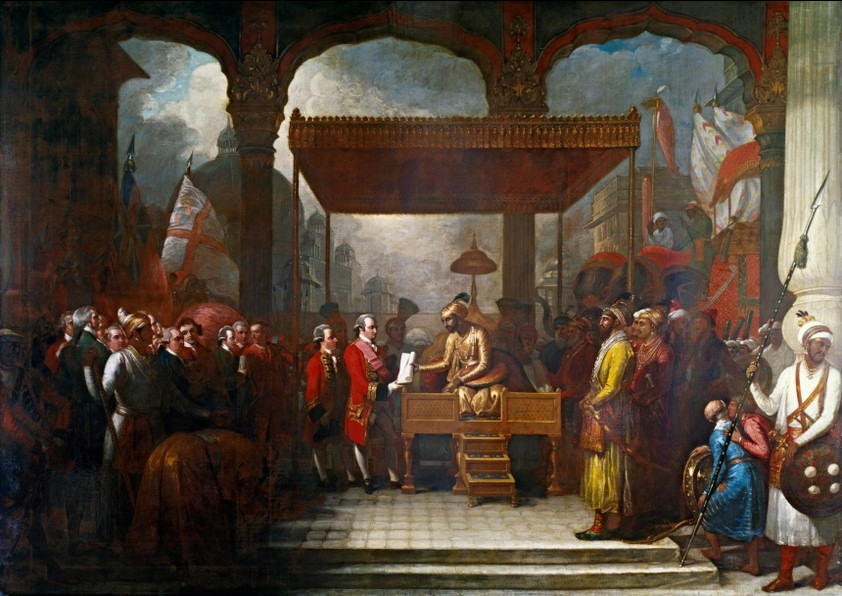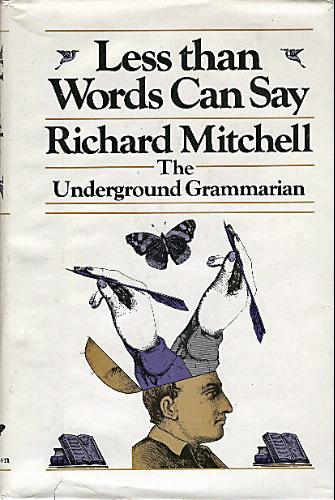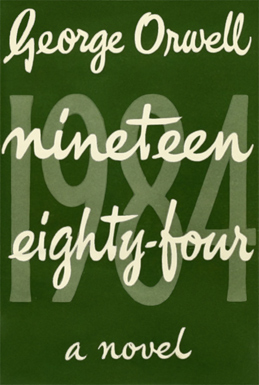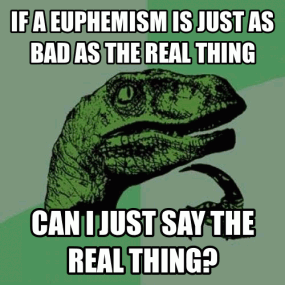Extra Credits
Published on 15 Jun 2019Bertrand du Guesclin was the hero the French needed. Focused on fortifying defenses and cities, Guesclin rebutted the advances of the Black Prince — who ended up contracting an illness that undid his iconic image of triumph and chivalry. Edward became beset by drama in the royal court, and England started to lose power…
Thanks again to David Crowther for writing AND narrating this series! https://thehistoryofengland.co.uk/pod…
Join us on Patreon! http://bit.ly/EHPatreon
June 16, 2019
History of England – Ashes – Extra History – #4
Encountering Richard Mitchell’s Less Than Words Can Say
In Quillette, Mark Andre Alexander recounts his first brush with “The Underground Grammarian”:
My first upper division English class shocked me when a dinosaur English professor, Dr. David Bell — a professor in Richard Mitchell’s mold, but not yet a curmudgeon — gave me my first C on a paper, busting my A-student self-image. That wake-up call helped me to see that, although I was published, I had much to learn about writing. Worse, in my first graduate course, Bell’s “Austen and Bronte,” I discovered that I had much to learn about reading, and that I lacked the acuity to appreciate Jane Austen’s clear, witty, and precise prose.
Not long before, I’d read Richard Mitchell’s first book, Less Than Words Can Say. I don’t recall how I stumbled upon him. I’d probably read some opinion column that referred to his work. In a publication announcement in the Underground Grammarian, Mitchell described it as “a melancholy meditation on the dismal consequences of the new illiteracy.”
He had wanted to title the book The Worm in the Brain, pointing to the dangers of administrative rhetoric. The publisher rejected that title as “too frightening and grisly,” But I knew I had found a fellow traveler when I read his Foreword:
Words never fail. We hear them, we read them; they enter into the mind and become part of us for as long as we shall live. Who speaks reason to his fellow men bestows it upon them. Who mouths inanity disorders thought for all who listen. There must be some minimum allowable dose of inanity beyond which the mind cannot remain reasonable. Irrationality, like buried chemical waste, sooner or later must seep into all the tissues of thought.
With that prophetic book, I first experienced the “cleansing fire [that] leaps from the writings of Richard Mitchell,” as George F. Will later described it.
Mitchell did title the first chapter “The Worm in the Brain,” in which he told the story of a colleague who would send him a note whenever there was some committee meeting. At first the note read something like, “Let’s meet next Monday at two o’clock, OK?” But when he aspired to become assistant dean pro tem, the simple, perfect prose changed. “This is to inform you that there will be a meeting next Monday at 2:00.” After achieving that appointment, the note read, “You are hereby informed that the committee on Memorial Plaques will meet on Monday at 2:00.” The worm in the brain had done its work.
I began to notice the worm in the brain during my everyday interactions with friends and colleagues at the university, especially the English professors. It often took the form of a label which created an image in the brain that prevented thought. One such professor, smart and engaging, returned a paper analyzing a passage in the U.S. Constitution. She gave the paper an A, but added, “I can’t help but feel that your argument is wrong, although I can’t explain why. I showed it to my husband, and he thought that it was a conservative argument.”
That statement invalidated the A, and I experienced my first taste of how subtly an abstract label can paralyze an otherwise thoughtful mind. Years later, while teaching at a business college, I saw a more pronounced form of the same phenomena. During a Business English class, I chatted with a bright student who volunteered for the NAACP. We would discuss all kinds of interesting topics, such as the similarities and differences between Martin Luther King and Malcolm X.
That is, until I noticed a change. She had stopped talking to me like a fellow human being and started talking at me like a white male. I stopped her and asked if she noticed what she had just done. She hadn’t, so I pointed out that she had shifted from talking to me to talking to an image inside her head. I told her that I would hold my hand up and block my face every time she did it. As the conversation proceeded, and I raised my hand, lowered it, and then raised it again, she became aware of the worm in her brain, a mental-emotional implant that prevented her from treating me as a colleague when certain topics were engaged.
Her implant was creating rubbish, of course, but it was insidious by nature because it disguised itself as something in the real world. Worms in the brain are like that.
June 10, 2019
The intended message of George Orwell’s Nineteen Eighty-Four
There are few novels which have been so enthusiastically claimed by partisans of both the right and the left — sometimes simultaneously — for misunderstood reasons. Orwell wasn’t warning us about technology (although he brilliantly illustrated how technology can be harnessed in service of the state), nor was he somehow warning us about the evils of current or recent politicans (Reagan, Bush, Trump). Orwell, a dedicated life-long socialist, was warning us of the dangers of totalitarianism, particularly the communist style of totalitarianism:
June 8, 2019, marks the 70th anniversary of George Orwell’s dystopian novel 1984. There will be no shortage of think pieces that will misinterpret its legacy. They will focus on social media, security cameras, data collection, and “fake news.” The problem? The novel was not a commentary on the downside of technology. It was meant to warn against the growing spread of communism.
In the decades since the time of its publication, the context of Orwell’s magnum opus has been lost. What remains in the cultural memory are simply fragments of the larger picture: government censorship, ubiquitous surveillance cameras, and Orwell’s clever neologisms (Newspeak, doublethink, and thoughtcrime, among others). This selective recall has led to a widespread misreading of the book’s original warning.
[…]
From the left, most present-day articles and blog posts project the character “Big Brother” onto President Donald Trump, like Eliot Namay’s column in the May 6 edition of the Charleston Gazette-Mail. They typically focus on Trump’s fevered populism and his penchant for impulsive speech, which can lead him to play fast and loose with facts.
Sales of 1984 spiked dramatically after his inauguration in 2017 when White House Press Secretary Sean Spicer (incorrectly) touted the “largest audience ever to witness an inauguration.” Trump advisor Kellyanne Conway later defended the claim on Meet the Press, blurting out the now infamous phrase, “alternative facts.” Scores of news stories compared her gaffe to Orwell’s “Newspeak” and “doublethink.” It’s also fairly common to read comparisons of Trump’s rallies to the “Two Minutes Hate” depicted in 1984.
Comparisons from the right, on the other hand, generally focus on the politically correct speech codes of colleges and universities or on the massive data gathering of big tech companies like Facebook and Google, warning readers that “Big Brother is Watching You.” Kalev Leetaru explores both of these issues in his May 6 column in Forbes, where he compares the social media de-platforming trend to Orwell’s “unperson” status. Notably, sales of 1984 also spiked in 2013 after Edward Snowden leaked details of the NSA’s mass collection of internet and phone records. A slew of articles followed, asserting that 1984 had arrived.
A certain amount of hyperbole is a characteristic of today’s reporting and commentary, but current comparisons to 1984 are inappropriate. Again, George Orwell was writing about a specific regime. Big Brother was an obvious reference to “Uncle Joe” Stalin, a uniquely evil dictator. Trump has his shortcomings, but he is no Stalin. A president who is prone to exaggeration does not equal a government-controlled press (which the Soviet Union had). The “Two Minutes Hate” recalled Stalin’s public demonization of Trotzky, who dared to criticize Stalin’s tactics. Data collection is a growing concern, to be sure, but it doesn’t precede a terrifying knock on the door from the KGB.
May 11, 2019
May 4, 2019
Justin Trudeau’s (French) language problem
Colby Cosh reports on a recent academic paper that sticks the boots into the little potato and his, um, problematical French language issues:
Thursday’s hot-off-the-press Post contained a short summary (by CP’s Giuseppe Valiante) of a recent academic paper about how Justin Trudeau’s handling of spoken French is regarded in Quebec. In case you didn’t read Valiante’s summary, I’ll give you a four-word abstract: it drives people nuts. Obviously it’s hard to know how many Quebeckers are really annoyed or nauseated by the prime minister’s French, but if you judge by the newspapers, as Binghamton University French-language scholar Yulia Bosworth did in her article for the American Review of Canadian Studies, it seems Trudeau is the equivalent of fingernails scraping a chalkboard forever.
Hungry with curiosity, I got hold of Bosworth’s paper, entitled “The ‘Bad’ French of Justin Trudeau: When Language, Ideology, and Politics Collide.” As writing it suffers from the typical defects of published scholarship in the humanities: as the title suggests, it is one of those things in which every mental construct of any kind becomes an “ideology.” As scholarship it is pretty good: it contains a useful potted history of Quebecois linguistic self-hatred, and how “Quebec French” went from being a perennial object of shame to a rigid conscious standard, enforced with the same pride and viciousness as Parisian French within France.
But as disguised comedy, the article can’t be beat. When Bosworth wants to give the flavour of her sample corpus of Quebec newspaper abuse of Trudeau, she has to clear her throat professorially first. “Titles, arguably, play an important role in constructing public images; they constitute visible and frequently consumed newspaper content and help construct a linguistic landscape.” Zzzz. But then you get to the good stuff, the distilled liquor:
In Justin Trudeau’s case, headline readers encountered ‘a beautiful empty shell,’ ‘the little boy,’ ‘a privileged target,’ ‘a thinker of nothingness,’ ‘a deserter,’ a ‘mythical hero,’ ‘window dressing for radical individualism,’ ‘a young dilettante,’ and ‘Justin-the-Red.’ Among the many examples of negative descriptors pinned on Trudeau are: ‘smokescreen,’ ‘the call of the void,’ ‘hypocrisy,’ ‘lack of courage,’ and ‘Pee-Wee’s revenge.’ In terms of adjectives, Trudeau was called ‘slimy,’ ‘tricked,’ ‘attacked,’ ‘targeted,’ ‘troubled,’ and ‘criticized.’
Obviously there is a lot of that sort of talk around, and certainly JT gets a rough ride in the Post and the Alberta broadsheet papers from time to time, but I think only in Quebec do you find this language in headlines, rather than in the comment threads or your uncle’s Facebook feed. (“Radical individualism”? Really?)
April 24, 2019
April 5, 2019
If Shakespearean Insults Were Used Today – Anglophenia Ep 13
Anglophenia
Published on 24 Sep 2014Siobhan Thompson reacts to everyday office frustrations with some barbs from the Bard. Check out the Shakespeare plays from which the insults originated here: http://www.bbcamerica.com/anglophenia…
March 21, 2019
QotD: Pie language
Even in their early days, pies served different purposes for the rich and poor: as show-off delicacies for the former and portable food for the latter. So while wealthy feasts might include pies containing anything from game birds to mussels, the less well-off used simpler pies as a way to have food while doing outdoor work or travelling – the crust both carried and preserved the tasty filling.
Take, for example, the Bedfordshire Clanger: a British classic which cleverly combines main course and dessert, with savoury ingredients like pork at one end and sweet ingredients like pear at the other. The name comes from a local slang word, “clang”, which means to eat voraciously. However, cramming two courses into a pie makes a clanger rather unwieldy – and all too easy to drop, inspiring the English phrase “dropping a clanger” for a careless mistake.
Pies have been adding rich flavour to the English language for centuries. Even Shakespeare got in on the act, writing in his 1613 play Henry VIII that “No man’s pie is freed from his ambitious finger”, giving English the phrase “a finger in every pie”.
Meanwhile, the description of a drunken state as “pie-eyed” likely takes its cue from someone who, thanks to having over-imbibed, has eyes as wide and blank as the top of a pie. “As easy as pie” – first recorded as “like eating pie” in the horse-racing newspaper Sporting Life in 1886 – springs from pies’ historical role as convenience food.
“Eating humble pie”, meanwhile, comes from medieval deer hunting, when meat from a successful hunt was shared out on the basis of social status. While the finest cuts of venison went to the rich and powerful, the lower orders made do with the “nombles“: a Norman French word for deer offal. Anglicisation saw “nombles” pie become “humble” pie.
Norman Miller, “How a pocket-sized snack changed the English language”, BBC Travel, 2017-03-29.
March 11, 2019
QotD: The purpose of language
But back to the mystics in general. I refuse to be swallowed up by their bullshit, nor do I allow myself to feel in any way inferior to their apparent greater knowledge. I once listened to some consultant describe a proposed change, and the description was filled with consultant-jargon — oh yes, they too have to impress clients with their insider language — and when he was done, I said, as succinctly as I could: “I didn’t understand a single thing you just said. Could you restate it, but in plain English this time?”
“Oh,” he stammered, “I simply meant that we need to streamline the process to shorten our product’s time-to-market.”
“You mean, the time between the thing’s production and its appearance on the retailer’s shelf?”
“Yes.”
“Then why didn’t you just say that, instead of having me waste both our time by getting you to explain it to me?”Roger Moore put it best, I think: “The point of language is to communicate your thoughts in the shortest possible time and in the clearest possible way.” My corollary to that excellent sentiment is, “And if somebody is not doing that, he’s pursuing a different agenda or has something he wishes to disguise.”
And finally, I should point out that Moore’s “clarity” does not equal “simplistic” (I nearly wrote simplisme, but you guys would have chased me from the room, and justifiably so).
Semper claritas should be your guiding principle.
Kim du Toit, “Mystics”, Splendid Isolation, 2017-03-28.
February 21, 2019
Simplified, consistent English
You may have encountered this short article usually attributed to Mark Twain (or alternatively to M.J. Shields in a letter to The Economist):
For example, in Year 1 that useless letter “c” would be dropped to be replased either by “k” or “s”, and likewise “x” would no longer be part of the alphabet. The only kase in which “c” would be retained would be the “ch” formation, which will be dealt with later. Year 2 might reform “w” spelling, so that “which” and “one” would take the same konsonant, wile Year 3 might well abolish “y” replasing it with “i” and Iear 4 might fiks the “g/j” anomali wonse and for all.
Jenerally, then, the improvement would kontinue iear bai iear with Iear 5 doing awai with useless double konsonants, and Iears 6-12 or so modifaiing vowlz and the rimeining voist and unvoist konsonants. Bai Iear 15 or sou, it wud fainali bi posibl tu meik ius ov thi ridandant letez “c”, “y” and “x” — bai now jast a memori in the maindz ov ould doderez — tu riplais “ch”, “sh”, and “th” rispektivli.
Fainali, xen, aafte sam 20 iers ov orxogrefkl riform, wi wud hev a lojikl, kohirnt speling in ius xrewawt xe Ingliy-spiking werld.
Along the same lines, here’s a new take on the idea of making the English language phonetically consistent:
H/T to Rob Beschizza for the link.
February 19, 2019
QotD: Internal contradictions of political correctness
… there was an article in the magazine arguing, on what might loosely be called philosophical grounds, for an end to the separation of men and women in sports. Women tennis players, for example, should compete against men, even if this means (as it does) that no woman could ever again make a living as a tennis player. In the name of equality of the sexes, one sex should be eliminated from a whole field of endeavor. Presumably, also, there should be no concessions for the handicapped, who would be forced to compete not against those similarly handicapped but against the fully fit.
Though this be madness, yet there is method in it: For the greater political correctness’ violation of common sense, the better — at least if its goal is power over men’s minds and conduct. In this sense it is like Communist propaganda of old: The greater the disparity between the claims of that propaganda and the everyday experience of those at whom it was directed, the greater the humiliation suffered by the latter, especially when they were obliged to repeat it, thus destroying their ability to resist, even in the secret corners of their heart. That is why the politically correct insist that everyone uses their language: Unlike what the press is supposed to do, the politically correct speak power to truth.
One of the strange things about the politically correct is that they never seem to become bored with their own thoughts. And this leads to a dilemma for those who oppose political correctness, for to be constantly arguing against bores is to become a bore oneself. On the other hand, not to argue against them is to let them win by default. To argue against rubbish is to immerse oneself in rubbish; not to argue against rubbish is to allow it to triumph. All that is necessary for humbug to triumph is for honest men to say nothing.
Theodore Dalrymple, “Two Forms of Mass Hysteria”, Taki’s Magazine, 2017-03-11.
February 13, 2019
The origins of the word “loot”
William Dalrymple wrote about the Honourable East India Company for the Guardian a few years back, including the way the word “loot” entered common English usage:

The Mughal emperor Shah Alam hands a scroll to Robert Clive, the governor of Bengal, which transferred tax collecting rights in Bengal, Bihar and Orissa to the East India Company, August 1765.
Oil painting by Benjamin West (1738-1820) via Wikimedia Commons.
One of the very first Indian words to enter the English language was the Hindustani slang for plunder: “loot”. According to the Oxford English Dictionary, this word was rarely heard outside the plains of north India until the late 18th century, when it suddenly became a common term across Britain. To understand how and why it took root and flourished in so distant a landscape, one need only visit Powis Castle.
The last hereditary Welsh prince, Owain Gruffydd ap Gwenwynwyn, built Powis castle as a craggy fort in the 13th century; the estate was his reward for abandoning Wales to the rule of the English monarchy. But its most spectacular treasures date from a much later period of English conquest and appropriation: Powis is simply awash with loot from India, room after room of imperial plunder, extracted by the East India Company in the 18th century.
There are more Mughal artefacts stacked in this private house in the Welsh countryside than are on display at any one place in India – even the National Museum in Delhi. The riches include hookahs of burnished gold inlaid with empurpled ebony; superbly inscribed spinels and jewelled daggers; gleaming rubies the colour of pigeon’s blood and scatterings of lizard-green emeralds. There are talwars set with yellow topaz, ornaments of jade and ivory; silken hangings, statues of Hindu gods and coats of elephant armour.
Such is the dazzle of these treasures that, as a visitor last summer, I nearly missed the huge framed canvas that explains how they came to be here. The picture hangs in the shadows at the top of a dark, oak-panelled staircase. It is not a masterpiece, but it does repay close study. An effete Indian prince, wearing cloth of gold, sits high on his throne under a silken canopy. On his left stand scimitar and spear carrying officers from his own army; to his right, a group of powdered and periwigged Georgian gentlemen. The prince is eagerly thrusting a scroll into the hands of a statesmanlike, slightly overweight Englishman in a red frock coat.
The painting shows a scene from August 1765, when the young Mughal emperor Shah Alam, exiled from Delhi and defeated by East India Company troops, was forced into what we would now call an act of involuntary privatisation. The scroll is an order to dismiss his own Mughal revenue officials in Bengal, Bihar and Orissa, and replace them with a set of English traders appointed by Robert Clive – the new governor of Bengal – and the directors of the EIC, who the document describes as “the high and mighty, the noblest of exalted nobles, the chief of illustrious warriors, our faithful servants and sincere well-wishers, worthy of our royal favours, the English Company”. The collecting of Mughal taxes was henceforth subcontracted to a powerful multinational corporation – whose revenue-collecting operations were protected by its own private army.
It was at this moment that the East India Company (EIC) ceased to be a conventional corporation, trading and silks and spices, and became something much more unusual. Within a few years, 250 company clerks backed by the military force of 20,000 locally recruited Indian soldiers had become the effective rulers of Bengal. An international corporation was transforming itself into an aggressive colonial power.
Using its rapidly growing security force – its army had grown to 260,000 men by 1803 – it swiftly subdued and seized an entire subcontinent. Astonishingly, this took less than half a century. The first serious territorial conquests began in Bengal in 1756; 47 years later, the company’s reach extended as far north as the Mughal capital of Delhi, and almost all of India south of that city was by then effectively ruled from a boardroom in the City of London. “What honour is left to us?” asked a Mughal official named Narayan Singh, shortly after 1765, “when we have to take orders from a handful of traders who have not yet learned to wash their bottoms?”
January 17, 2019
Tolkien and Herbert – The World Builders – Extra Sci Fi
Extra Credits
Published on 15 Jan 2019Mythic worldbuilding and intentionality just weren’t staples of science fiction until the works of J.R.R. Tolkien and Frank Herbert were published. We’ll be doing an analysis of The Lord of the Rings and Dune, respectively — works that still stand out today because they are meticulously crafted.
December 11, 2018
QotD: Academia
Academia has an infantilizing effect. I understand that. Many professors dress and act like adolescents right up to the time they are ready to hand in their tenure and live off their generous pensions. The Peter-Pan aspect of academia is not entirely the professors’ fault. After all, the points at which the real world intrudes upon academia are so few and so tenuous that academics may be forgiven for some of their hyperbole and inadvertently comic displays of self-importance. They exist, like kept women of yore, entirely at the pleasure of an affluent society they despise. So in a way it is not surprising that they endeavor to transform their entire campus into a sort of existential boudoir, which is French for “room for pouting in.”
Roger Kimball, “A Modest Disposal”, PJ Media, 2017-01-15.
December 9, 2018
Everyone please update your Newspeak dictionaries…
Mark Steyn suggests we’ll soon be unable to use compass directions in spoken or written work, for fear of causing offence:
Things you can no longer say:
I was in the big city earlier this week, and so saw for the first time in ages a physical copy of The New York Times. It contained an interview with James Dyson, the brilliant re-inventor of vacuum cleaners and much else. The Times felt obliged to preface Sir James’ words with a health warning for the easily triggered:
In this interview, Mr. Dyson expressed antiquated and at times offensive views on “racial differences” and Japanese culture. He also referred to growth markets in Asia as the “Far East.”
He used the term “Far East”!!! What the hell was he thinking?????? Good thing he has no plans to run for public office or host a cable show. The old British Foreign Office joke about the “Near East” (which is more generally referred to as the Middle East) is that they call it the Near East because it’s always nearer than you think. But start referring to the Far East and the instant vaporization of your entire career is a lot nearer than you think.
“Far East” is, I suppose, literally Eurocentric. But then so is “Midwest”. Perhaps the Times now finds any point of view or perspective “offensive”. Perhaps it is time to ban such “antiquated” concepts as north, south, east and west – and indeed the very compass. The abolition of instruments of navigation would seem a necessary condition for the future we’re sailing to.








